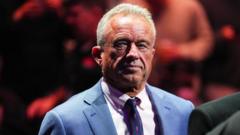Facing skepticism and strong industry opposition, Robert F. Kennedy Jr. pledges to change America's food landscape by reducing ultra-processed foods and harmful additives, introducing a controversial agenda that intertwines health issues and regulatory challenges.
RFK Jr's Bold Vision to Revolutionize American Diet: Can He Do It?

RFK Jr's Bold Vision to Revolutionize American Diet: Can He Do It?
Robert F. Kennedy Jr. aims to tackle ultra-processed foods and dietary additives as he approaches a confirmation to lead the Department of Health and Human Services.
Robert F. Kennedy Jr. is setting his sights on transforming America’s food habits with a bold agenda aimed at eliminating ultra-processed foods and harmful additives. Known for his controversial health claims, Kennedy has taken on a crucial role as President-elect Donald Trump's nominee for the Department of Health and Human Services (DHHS). He cites glaring concerns with ingredients found in products like Fruit Loops and chicken nuggets, claiming they pose serious health risks to Americans, especially children.
“We are betraying our children by allowing [food] industries to poison them,” Kennedy asserted during a recent rally, indicating a desperate need for change in the food industry. Indeed, if he intends to push for significant overhauls in dietary guidelines and food safety regulations, he will have to navigate the treacherous waters of entrenched corporate interests – commonly referred to as "Big Food."
Kennedy’s commitment to reform has gained attention from both experts and lawmakers. Colorado Governor Jared Polis welcomed his nomination, although he emphasized that “science must remain THE cornerstone of our nation’s health policy.” He anticipates that Kennedy will disrupt FDA practices to prioritize public health over corporate profit.
Kennedy’s initiative, branded as “Make America Healthy Again,” includes ambitious reforms aiming to take on chronic diseases linked to poor dietary choices. He argues for the removal of ultra-processed foods in schools, highlighting their association with serious health issues such as cancer and diabetes. Given his impending oversight of the FDA, which is in charge of food safety, the nutrition department’s inadequacies stand in his crosshairs.
The FDA regulates a vast array of products, but Kennedy has criticized the agency's operations for being ineffective and corrupt, stating that drastic personnel changes may be necessary. He also targets food dyes and additives, including Red No. 3, advocating for stricter safety standards that align with those in the European Union.
While some public health experts support elements of Kennedy's proposals, caution lingers regarding some of his broader claims. Critics argue that his aggressive stance against issues like fluoride in drinking water could undermine public health initiatives proven to reduce dental decay. Moreover, assertions that seed oils contribute to the obesity epidemic lack scientific backing, according to experts.
Navigating the complex American food regulatory landscape, Kennedy may encounter substantial pushback from various industry factions. A critical aspect of his role at the DHHS will involve collaboration with other agencies, including the USDA, providing additional hurdles for any sweeping changes.
While the aim to curtail ultra-processed foods is welcomed by many public health advocates, previous attempts to introduce significant reforms have often faltered due to political and bureaucratic challenges. As calls for a healthy American diet grow louder, Kennedy's initiatives must balance public health aspirations with the realities of existing policy frameworks and industry influence.
Ultimately, amidst the lofty rhetoric and ambitious objectives, the feasibility of Kennedy's vision for transforming America’s diet remains to be seen. His agenda may evoke necessary discussions on nutrition and health policy, yet critics warn that the journey toward actual implementation is fraught with complexities and risks.




















